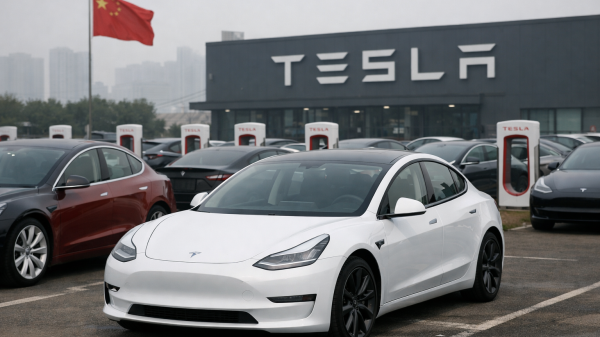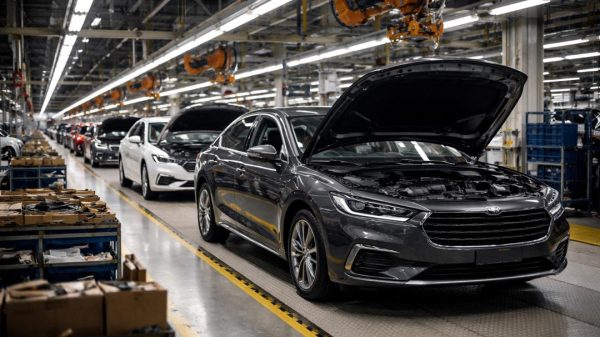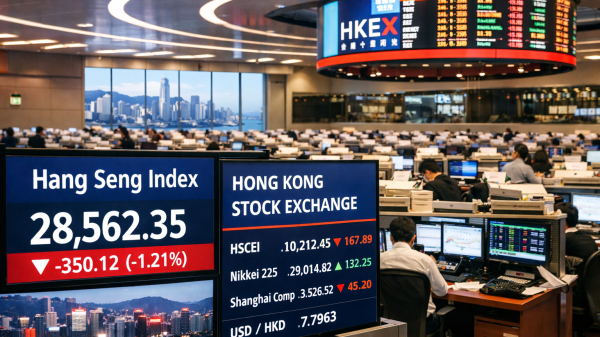European stock markets opened with modest gains on Tuesday, attempting to build on recent positive momentum, but the automotive sector immediately faced headwinds as major manufacturers reported disappointing earnings and flagged concerns related to US tariffs and market uncertainty.
Investors parsed a heavy slate of corporate results for fresh insights into the health of European businesses amid a complex global economic backdrop.
Cautious gains tempered by auto weakness
The pan-European Stoxx 600 index ticked up 0.21% shortly after the open (around 8:15 a.m. London time), indicating a tentative extension of the recent positive trend which saw the index recover its year-to-date losses.
Regional indices showed a mixed picture: Germany’s DAX gained 0.2%, while France’s CAC 40 dipped slightly by 0.1%, and the UK’s FTSE 100 was expected to open marginally higher according to earlier IG data.
Italy’s MIB was also projected to see modest gains.
However, the Stoxx 600 Autos & Parts index immediately shed 0.4%, acting as a drag on broader market performance.
This weakness was primarily driven by significant share price declines for major carmakers following concerning earnings updates.
Volvo cars slumps, scraps guidance amid headwinds
Swedish automaker Volvo Cars saw its shares tumble after reporting a sharp drop in first-quarter operating profit and taking the significant step of suspending its financial guidance for both 2025 and 2026 due to prevailing market challenges.
The company, majority-owned by China’s Geely Holding, posted Q1 operating profit of 1.9 billion Swedish krona ($1.87 billion), a steep decline from 4.7 billion krona in the same period last year.
Volvo attributed the slump to lower wholesale volumes resulting from a planned inventory reduction, adverse currency movements, and broader turbulence within the automotive industry, implicitly including tariff impacts.
The withdrawal of forward-looking guidance signals deep uncertainty about the near- to medium-term outlook.
Porsche trims forecasts, cites US tariffs and China demand
Adding to the auto sector’s woes, luxury carmaker Porsche also faced pressure after trimming its sales and profit margin forecasts for the 2025 financial year in an update released after Monday’s market close.
The German manufacturer, majority-owned by Volkswagen Group, explicitly cited the impact of US tariffs as a contributing factor.
Porsche now anticipates sales revenue between 37 billion and 38 billion euros (down from 39-40bn), cut its automotive net cash flow margin target to 4%-6% (from 7%-9%), and lowered its automotive EBITDA margin guidance to 16.5%-18.5% (from 19%-21%).
“The introduction of US import tariffs leads to negative impacts for the months of April and May 2025 which are included in the adjusted forecast,” Porsche stated, cautioning that it was not yet possible to reliably assess the full-year effects.
The company also noted challenges related to waning demand for all-electric luxury vehicles in the key Chinese market.
Oil giant BP misses profit expectations
Elsewhere in corporate news, British energy major BP reported first-quarter underlying replacement cost profit (a proxy for net profit) of $1.38 billion.
While up from the previous quarter, this figure missed analyst expectations of $1.6 billion (LSEG consensus) and was significantly lower than the $2.7 billion profit recorded a year earlier, reflecting the impact of weaker crude oil prices and potentially strategic adjustments within the company.
Focus on data and global cues
Beyond earnings, investors awaited key economic data, including Spanish GDP figures, ahead of wider Eurozone growth data due Wednesday.
Close attention will also be paid to US jobs market data later Tuesday for clues about the health of the world’s largest economy and its potential influence on Federal Reserve interest rate policy.
The generally positive open in Europe followed mostly higher trading in Asia-Pacific overnight, while US stock futures were near flat ahead of another busy day for earnings stateside.
Despite the immediate pressure on the auto sector, the broader European market attempted to hold onto recent gains, navigating a complex mix of corporate results and macroeconomic factors.
The post Europe markets open: stocks edge higher; auto sector drags on Volvo, Porsche warnings appeared first on Invezz




































